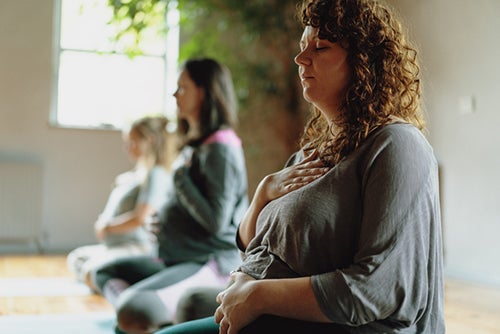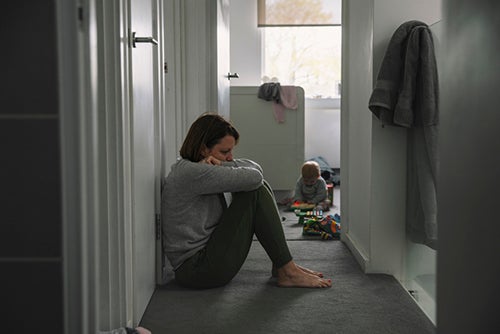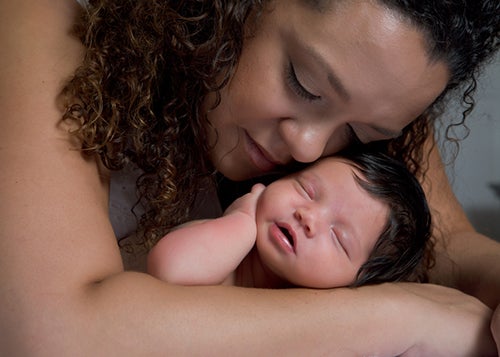Rachel Rice, NP, on Mental Health During Pregnancy, Labor & Delivery and Postpartum
April 29, 2025A trip to the hospital is rarely a good thing — unless you're expecting a baby. Having a baby, for many families, is a joyous occasion, and the pregnancy, labor & delivery and postpartum periods are looked upon with great expectation.
Yet, fluctuating hormones, financial concerns, lack of support and pregnancy-related illnesses, can lead to challenging mental health issues, namely depression and anxiety. Rachel Rice, a WakeMed mental health nurse practitioner who sees various patients throughout WakeMed Raleigh Campus, is here to share what women might experience and how they can navigate and overcome the baby blues.
Are there brain or hormonal changes that make women more prone to mental health challenges during pregnancy?
Estrogen and progesterone increase in the body and brain throughout pregnancy. Progesterone is a feel-good hormone, so some women feel great. But, women who are more sensitive to hormonal changes might suffer as a result of fluctuations in estrogen and progesterone. For example, some women become cranky and irritable. Others may have worsening anxiety and depression.

Why else might women struggle with their mental health during pregnancy?
- Psychosocial factors may cause conflicted feelings about the pregnancy.
- A woman may not be receiving the support from her partner that she expected. If she's alone, she may become depressed.
- Additionally, underlying preexisting mental health disorders, such as depression, anxiety, bipolar disorder and obsessive compulsive disorder (OCD), are often amplified during major life changes.
- Some women choose to stop all medications during pregnancy, which could lead to a plethora of consequences. For example, if a woman abruptly halts psychiatric medications, she may experience a significant increase in depression or anxiety. Some women develop an intense fear that something bad will happen to themselves or their baby — to a point that it disrupts their daily life. Women should discuss safe medication management with their obstetrician during pregnancy.
What can a pregnant or postpartum woman do to nurture her mental health?
Women need to ramp up their support, whether that be extended family, a significant other, midwife, obstetrician or doula.
Here are some emotional support needs a woman will likely have from her support system:
- Encouragement and reassurance
- Affection (sometimes less sex, but more physical touch)
- Help modifying her lifestyle
- Support in healthy eating
- Time for more breaks and naps
- More time to walk and talk together
How can a woman mentally prepare for delivery?
Expectant moms can make a birth plan for the day of labor & delivery to achieve a sense of control over what will happen.
The process of writing a birth plan, even if never shared, can release a lot of anxiety since it can help an expectant mother work through her thoughts about that day.
Sharing the plan can make a measurable difference. A woman can give it to her doula and obstetrician in advance of her delivery, so they know her likes, dislikes and expectations, which can fuel a conversation about what realistically can be modified to make this a less stressful day.

During the post postpartum period, what hormonal changes can a woman expect?
After the baby is born, there is a huge drop drop in both progesterone and estrogen. When the placenta is delivered, it signals this huge dip. Some people are fine, and they do not notice any difference. Others feel absolutely terrible, and in addition, now have an infant that they may not feel comfortable caring for.
That is why women often experience a couple of weeks of baby blues after delivery. Massive hormone fluctuations, plus feeling overwhelmed, anxious, sad and sleep-deprived are a difficult mix.
When should a woman see a provider for possible symptoms of postpartum depression?
A woman with any level of concern about her postpartum mental health should schedule with a provider. This could include reaching out to her primary care provider, gynecologist, a midwife or even the baby's pediatrician. Scheduling an appointment with a psychiatrist or therapist can also be especially beneficial. A woman could request a referral to a perinatal psychiatrist, which is a mental health provider with additional knowledge and training to care for women during pregnancy and in the postpartum period. A directory of local perinatal psychiatrists can be found on Postpartum Support International.
What are the symptoms of postpartum depression?
A woman should be especially concerned if she is experiencing these symptoms during the first year after the baby is born:
- Overwhelming sadness and/or crying
- Irritability
- Anger
- Lack of interest in the infant
- Obsessive anxiety
- Thoughts of harming herself or the baby
Of particular note is when a woman is either completely uninterested in caring for her baby or is obsessed with the baby's care to that point that she is constantly questioning herself:
- Is the baby sleeping enough/too much?
- Is the baby eating enough?
- Am I breastfeeding often enough?
If a mother is indifferent or fearful to the point that it is interfering with her ability to properly care for her baby or herself, she is likely exhibiting signs of postpartum depression.

What are the signs of a postpartum medical emergency?
If a woman is having thoughts of hurting herself or her baby, is feeling suicidal or is suffering with intrusive thoughts, these are signs of a psychiatric emergency warranting emergency care.
Additionally, postpartum psychosis presents with even more concerning symptoms. It is a medical emergency and requires immediate medical care. Symptoms include the following:
- Disconnection from reality
- Delusions
- Hallucinations
- Severe sleep deprivation
- Extreme irritability
- Paranoia about those around her
Where can a woman seek ongoing mental health care?
If a woman bereaved from pregnancy or infant loss, or a mom of a young child (infant to toddler) is needing support, she may benefit from connecting with others.
- WakeMed Birth and Family Classes span the range from pregnancy to postpartum and also are available to various members of the family.
- WakeMed Parentcare provides support and comfort to families experiences loss.
- An online community is also available through Postpartum Support International. All provide resources for patients and their families.
Postpartum anxiety or depression could drag on without proper medical support, so women should never feel ashamed about seeking help right away.
Are there any risk factors for postpartum depression that a woman should be aware of to help with prevention after giving birth?
Some women are more susceptible to postpartum depression. Anyone with a prior history of a postpartum mood disorder is more likely to experience a recurrence in subsequent pregnancies. Those with preexisting anxiety, depression, bipolar disorder, etc. are more inclined to experience these issues as well.
Another major risk factor is sleep deprivation. A woman who suffers with insomnia or struggles to get her baby on a sleep schedule within a few months, is much more likely to develop postpartum depression or anxiety. The lack of sleep, even for those with no preexisting sleep conditions, can sometimes trigger severe psychiatric symptoms.
Having a plan for protected sleep — for at least a couple hours a night in the early months and eight hours per night in the later months — is essential. If a woman doesn't have the support of a partner, an overnight doula can step in and help.

According to the US Department of Health & Human Services and the Office on Women's Health, "approximately one in eight women report symptoms of postpartum depression in the year after giving birth." There is help and hope.
About Rachel Rice, NP
Rachel Rice is a psychiatric nurse practitioner who cares for patients across the lifespan with mental health needs. She has clinical interests in perinatal psychiatry as well as acute psychotic disorders. Rice holds a bachelor of science in nursing from Duke University in Durham, NC. She holds a master of science in nursing from East Carolina University in Greenville, NC.
